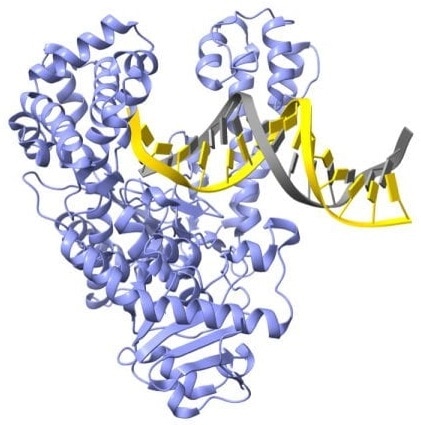Researchers from the University of California, Irvine’s Departments of Chemistry and Physics & Astronomy released a study in Sciences Advances that disclosed new facts about a critical enzyme that allows DNA sequencing. The discovery marks a significant step forward in the future of customized medicine when physicians will be able to construct medicines based on specific patients’ genomes.

This image shows the Taq enzyme in its open configuration waiting for a new chemical base to arrive so it can try to fit it to a DNA chain. Max Strul / UCI and Lorena Beese laboratory / Duke University. Image Credit: University of California, Irvine.
Enzymes make life possible by catalyzing chemical transformations that otherwise would just take too long for an organism. One of the transformations we’re really interested in is essential for all life on the planet—it is the process by which DNA is copied and repaired.”
Greg Weiss, Study Co-Corresponding Author and Professor, Chemistry, University of California, Irvine
The enzyme researched by the UCI-led team is named Taq, after the bacterium in which it was initially found, Thermos aquaticus. Taq is a DNA replication enzyme. Taq is used in a polymerase chain reaction, a method with hundreds of applications ranging from forensics to PCR testing to identify COVID-19.
The UCI-led research discovered that Taq, which aids in the replication of DNA, functions in a fundamentally different way than scientists had previously assumed. Weiss stated that instead of acting like a well-oiled, efficient machine constantly turning out DNA copies, the enzyme operates like an indiscriminate consumer cruising the aisles of a store, tossing whatever they see into the shopping basket.
Instead of carefully selecting each piece to add to the DNA chain, the enzyme grabs dozens of misfits for each piece added successfully. Like a shopper checking items off a shopping list, the enzyme tests each part against the DNA sequence it’s trying to replicate.”
Greg Weiss, Study Co-Corresponding Author and Professor, Chemistry, University of California, Irvine
Taq is well-known for rejecting any incorrect products that find their way into its virtual shopping cart—rejection is, after all, the key to properly copying a DNA sequence. The frequency with which Taq rejects proper bases is startling in the latest findings. “It’s the equivalent of a shopper grabbing half a dozen identical cans of tomatoes, putting them in the cart, and testing all of them when only one can is needed.”
The message of the story is that Taq is far less efficient than it might be at its job.
According to Philip Collins, a professor in the UCI Department of Physics and Astronomy and a co-corresponding author of the current study, the discovery represents a step toward changing medical treatment. Because scientists will be able to better understand how Taq works, they will be able to determine how accurate a person’s sequenced genome is.
Every single person has a slightly different genome, with different mutations in different places. Some of those are responsible for diseases, and others are responsible for absolutely nothing. To really get at whether these differences are important or healthcare—for properly prescribing medicines—you need to know the differences accurately.”
Philip G. Collins, Department of Physics and Astronomy, University of California, Irvine
Collins, whose team developed the nano-scale equipment for examining Taq’s activity, stated, “Scientists don’t know how these enzymes achieve their accuracy. How do you guarantee to a patient that you’ve accurately sequenced their DNA when it’s different from the accepted human genome? Does the patient really have a rare mutation,” asks Collins, “or did the enzyme simply make a mistake?”
“This work could be used to develop improved versions of Taq that waste less time while making copies of DNA,” Weiss explained.
The research’s implications extend beyond medicine; every scientific discipline that relies on precise DNA sequencing would benefit from greater knowledge of how Taq operates. Scientists make assumptions about how DNA evolves through a time when interpreting evolutionary relationships using ancient DNA, for example, and such assumptions are based on reliable genetic sequencing.
“We’ve entered the century of genomic data. At the beginning of the century we unraveled the human genome for the very first time, and we’re starting to understand organisms and species and human history with this newfound information from genomics, but that genomic information is only useful if it’s accurate,” Collins concluded.
UCI Press Release | Taq polymerase | Genetic sequencing
Video Credit: University of California, Irvine.
Source:
Journal reference:
Turvey, M. W., et al. (2022) Single-molecule Taq DNA polymerase dynamics. Science Advances. doi.org/10.1126/sciadv.abl3522.